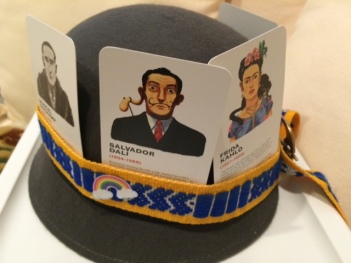
“Are you mad?” she demanded. “Have you completely lost it? Helloooo!”
I listened carefully. I’d always wondered exactly what this thing we call madness might really be. Maybe she would explain it to me. I was increasingly convinced that either I or everyone else was hopelessly mad, although I couldn’t tell which it was. Maybe if I had a better understanding of madness, I’d be able to decide.
I’d done some research.
The word “mad” occurs in my dictionary between the words “macule” and “Madagascar”. A “macule” (or “mackle”) is a printer’s term referring to “a spot, especially a blurred or double impression caused by a slipping of the type or a wrinkle in the paper.” I thought this might be a clue.
Madagascar, of course (formerly Malagasy Republic), is a large island off the southeastern coast of the African continent that I knew from my anthropological studies to be home to a collection of rather prehistoric primates long since extinct on the continent where monkeys and apes evolved and prevailed. Madagascar has no monkeys or apes – except for Homo sapiens, an invasive species. It does have dozens of species of lemurs as well as the exceptional sifaka, which moves by means of sidewise leaping. I thought this could be a clue as well.
To be mad, I thought, is like being caught somewhere between a blurred line on wrinkled paper and a sidewise leaping primate.
Etymologically, the word itself – “mad” – derives from the Old English gemaedde, meaning “out of one’s mind”. This evolved in Middle English into a meaning of being “beside oneself.”
As a student of Buddhist meditation, I find this intriguing. One of the goals of meditation is to be able to observe dispassionately and objectively one’s own thoughts and feelings. In other words, I suppose, we could say, to take up a position outside of one’s mind, as it were, or beside oneself as opposed to remaining hopelessly embedded and ensnared in one’s thoughts and emotions.
Interesting.
Is that madness?
Apparently so.
To be “mad” can also imply anger, although I don’t think that’s what my friend meant. I knew her usual term for that was “pissed off”. It’s true that anger can drive one mad. Also other people…
Then there is the question of rabies and rabid, “mad” dogs. Which brings up the altogether puzzling question of mad dogs, Englishmen, and midday sun, which, to be perfectly frank, the English have very little experience of.
There is something I recall about being far from the madding crowd, which often sounds enticing. And some seductive notion of a kind of “madness” that is liberating and wild and impetuous.
“Hello!” she said again. “You’ve really lost it this time! Gone off the deep end. Gone ‘round the bend. Mad as a hatter!”
“Do you know why hatters are mad?” I asked. “It’s because of the mercury they used in the production of the felt for the hats. Mercury poisoning,” I said.
She shook her head in despair. “You’re mad,” she said again. “You’re absolutely stark raving mad.”
“Did you know that the term ‘stark raving mad’ first appeared in Henry Fielding’s The Intriguing Chambermaid in 1734? But yes,” I said at last. I sighed deeply. “Yes, I believe I am mad. Would you care to join me?”
(This piece was originally presented at Austin Writers Roulette “Spark of Madness” on Sunday, September 13, 2015.)




